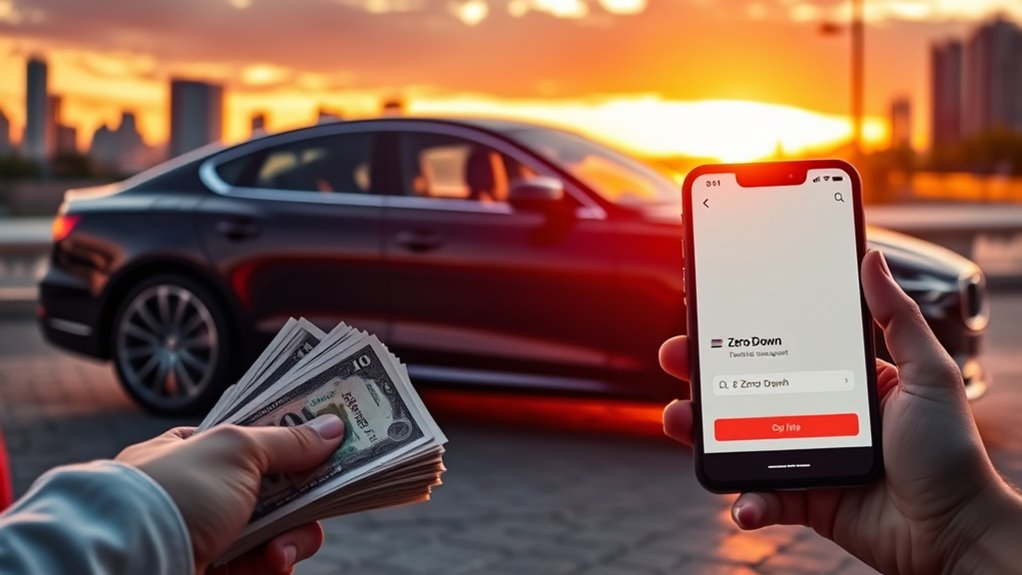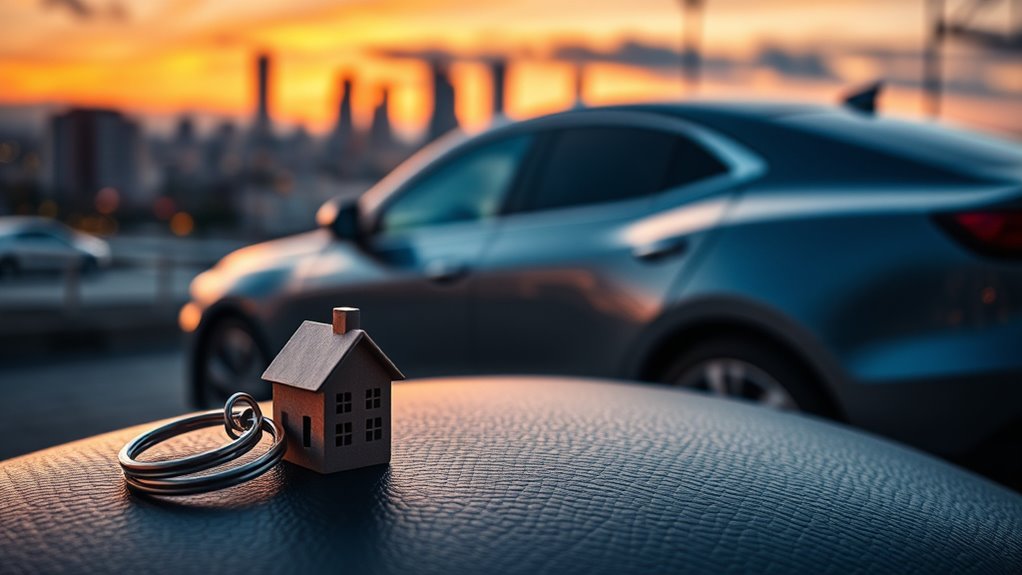Choosing a larger down payment lowers your monthly lease payments because it reduces the amount you finance, while zero down means higher monthly costs since you’re financing the full vehicle price. A big down payment can save you money overall and reduce the risk of owing more than the car’s worth. However, zero down keeps your cash available for other needs. To find out how each option fits your financial goals, keep exploring the details below.
Key Takeaways
- A larger down payment lowers monthly lease payments by reducing the financed amount.
- Zero down increases monthly payments because the full vehicle cost is financed upfront.
- Paying more upfront can reduce total interest or lease charges over the lease term.
- Zero down helps preserve cash flow but may result in higher overall costs.
- The choice depends on balancing immediate cash availability with long-term financial goals.

Deciding between making a sizable down payment or opting for zero down can substantially impact your financial future. When it comes to leasing, understanding how each choice affects your overall costs is essential for effective financial planning. A large down payment might seem like a hefty upfront expense, but it can greatly lower your monthly lease payments. This is because the lease cost is often calculated based on the vehicle’s residual value minus the amount financed, so putting more money down reduces the amount you need to finance. As a result, you’ll pay less each month, which can make your budget more manageable and provide peace of mind knowing you’re reducing your debt faster.
However, opting for zero down isn’t without its advantages. It allows you to preserve cash flow, giving you more flexibility to allocate funds elsewhere, such as savings, investments, or covering unexpected expenses. This approach can be particularly appealing if you prefer to keep your cash liquid or if you’re uncertain about your future financial stability. Still, keep in mind that a zero-down lease often results in higher monthly payments because you’re financing the entire vehicle cost. Over time, this can add up, and you might end up paying more in interest or lease charges, which could offset the benefits of keeping cash on hand.
From a leasing benefits perspective, a sizable down payment can also reduce the risk of owing more than the vehicle’s worth at the end of the lease term. This is especially relevant if you tend to drive more miles than the lease allows or if you’re concerned about depreciation. On the other hand, choosing zero down can make leasing more accessible to those with limited savings, allowing them to get into a vehicle without a significant initial outlay.
In terms of financial planning, your decision should align with your overall financial goals. If you’re aiming to minimize monthly expenses and pay off your lease faster, a larger down payment might be the way to go. Conversely, if maintaining liquidity and flexibility are more important to you, zero down can be advantageous—just be prepared for higher monthly costs. Additionally, understanding the importance of cash flow management can help you balance your lease payments with other financial priorities. Ultimately, weighing these options involves balancing upfront costs with ongoing payments, considering your cash flow, and understanding how each choice fits into your long-term financial strategy.
Frequently Asked Questions
How Does Credit Score Influence Lease Costs With or Without a Down Payment?
Your credit score directly impacts your lease costs, whether you make a down payment or not. A higher score usually means lower interest rates and better lease terms, saving you money. Conversely, a lower credit score can increase your lease costs because lenders see more risk, leading to higher payments. Even with a down payment, maintaining a good credit score helps you secure more favorable lease offers and reduce overall expenses.
Are There Specific Vehicle Types Better Suited for Zero Down Leasing Options?
Luxury vehicles and electric models are often better suited for zero down leasing options because they tend to have higher monthly payments that can be offset without an initial large payment. Imagine driving a sleek electric car without upfront costs—this is achievable if you choose models with lower depreciation rates. While some premium cars might require a down payment, many electric and luxury models offer attractive zero down lease deals, making them accessible options.
What Are the Long-Term Financial Impacts of Choosing Zero Down Over a Down Payment?
Choosing zero down increases your long-term costs because you’ll pay more in interest rates over time, and lower lease residuals can lead to higher payments at lease end. Without a down payment, you might gain lower monthly payments initially, but you’ll face higher total costs due to the compounding interest and reduced residual value. Consider your budget carefully, as a down payment can reduce these long-term financial impacts.
Can Leasing Terms Be Negotiated Differently Based on Initial Payment Choices?
Yes, leasing terms can be negotiated differently based on your initial payment choices. During leasing negotiations, you can often secure better terms by demonstrating initial payment flexibility, whether you’re making a larger down payment or opting for zero down. Leasing companies may be more willing to offer favorable interest rates or lower monthly payments if you show that you’re flexible with your initial payment, giving you more leverage in the negotiation process.
How Do Insurance Requirements Vary Between Down Payment and Zero Down Lease Options?
Think of insurance premiums like a shield—your coverage requirements depend on your lease type. With a down payment, you might secure lower premiums because the lender sees less risk. Zero down leases often mean higher coverage requirements, leading to increased premiums. You’ll need to meet specific insurance standards regardless, but your initial payment influences how much coverage you’re expected to carry, impacting your overall costs.
Conclusion
Choosing between a down payment and zero down is like deciding whether to build a fortress or go in unarmed—you’ll feel the impact every month. A hefty down payment can slash your lease costs dramatically, while zero down keeps your wallet happy upfront but tolls the cost over time. Think of it as the difference between a quick sprint and a marathon—pick what suits your pace and financial goals best!










